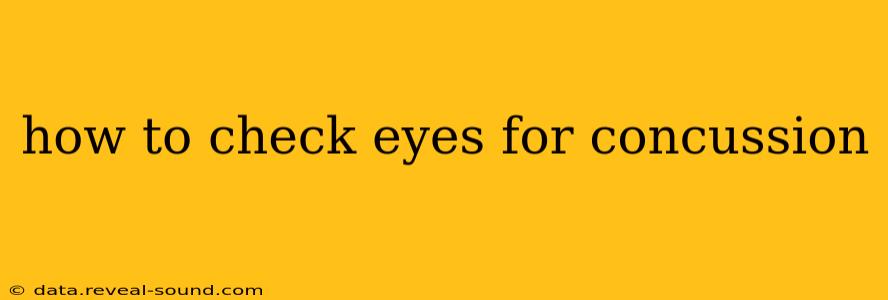A concussion, or mild traumatic brain injury (mTBI), can cause a range of symptoms, and subtle changes in eye function are often key indicators. While you should always seek professional medical attention if you suspect a concussion, understanding how to assess eye-related symptoms can be crucial in the initial stages and during ongoing recovery. This guide will explain how to check for eye-related signs of a concussion, emphasizing that this is not a replacement for a proper medical examination.
What are the Eye Symptoms of a Concussion?
Concussions can disrupt the intricate neurological pathways controlling eye movement and visual processing. Common eye-related symptoms include:
- Double vision (diplopia): Seeing two images of a single object.
- Blurry vision: Difficulty focusing or seeing clearly.
- Light sensitivity (photophobia): Increased sensitivity to light.
- Difficulty focusing: Problems concentrating on objects near or far.
- Eye strain or fatigue: Eyes feeling tired or strained even after minimal use.
- Nystagmus: Involuntary rapid eye movements. This can be subtle and difficult to detect without specific training.
- Pupil abnormalities: Unequal pupil size (anisocoria) or sluggish pupil response to light.
How to Perform a Basic Eye Exam (for informational purposes only; not a substitute for professional medical advice)
While you shouldn't attempt to diagnose a concussion yourself, observing these aspects can be helpful information for medical professionals:
1. Check for Double Vision
Ask the person to look at a single object, like your finger held at arm's length. Ask them if they see one or two images. If they see two, note the direction and degree of the separation.
2. Assess Visual Acuity
Ask the person to read something at a normal reading distance. Note any difficulty reading or blurring. This is a very rough assessment; a proper eye chart would be much more precise.
3. Observe for Nystagmus
Observe the person's eyes while they are looking straight ahead. Look for any involuntary jerking or rapid movements of the eyes. This is a more challenging assessment and subtle nystagmus may be missed.
4. Test Pupil Response (With Caution)
Shine a penlight into each eye, observing the constriction of the pupil (pupillary light reflex). Note if the pupils are equal in size and react similarly to light. This should be done with caution; improper technique can be harmful. This test is best performed by a trained medical professional.
5. Assess for Light Sensitivity
Observe the person's reaction to bright light. Do they squint, shield their eyes, or complain of discomfort?
What if I Notice These Symptoms?
If you observe any of these eye-related symptoms after a head injury, seek immediate medical attention. This is crucial for proper diagnosis and treatment. A healthcare professional will perform a comprehensive neurological exam and potentially additional tests to assess the extent of the injury.
Are there specific eye tests for concussion diagnosis?
Yes, a medical professional may use more sophisticated tests, such as:
- Visual field testing: This assesses the entire range of vision.
- Saccadic eye movement testing: Evaluates the ability to make quick, precise eye movements.
- Ocular motor testing: Assesses eye muscle coordination.
- Optokinetic nystagmus (OKN) testing: This tests the eye's ability to follow a moving target.
These tests provide more objective measurements of eye function and help in diagnosing and managing concussions.
When should I seek immediate medical attention?
Seek immediate medical attention if:
- You experience a loss of consciousness.
- You have severe headaches or worsening headaches.
- You have vomiting or nausea.
- You experience seizures.
- You have unequal pupil sizes (anisocoria).
- You have numbness or weakness in any part of your body.
- You have difficulty remembering events before or after the injury.
- You have changes in your behavior or personality.
Remember, this information is for educational purposes only and should not replace professional medical advice. Always consult a doctor or other qualified healthcare provider if you suspect a concussion. Early diagnosis and treatment are key to a successful recovery.
